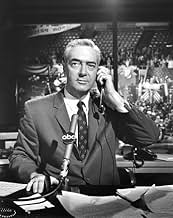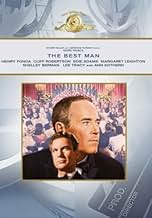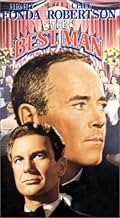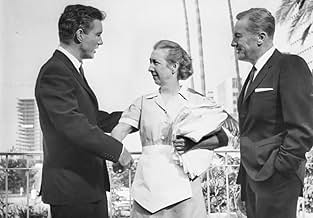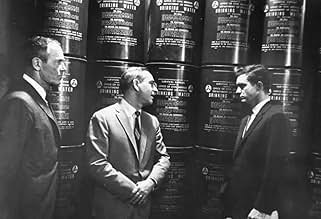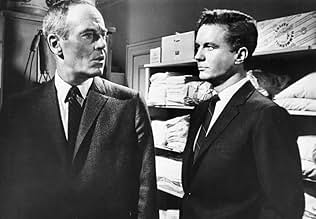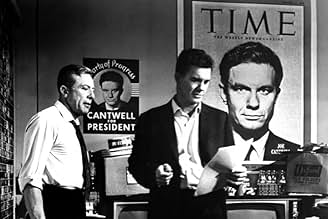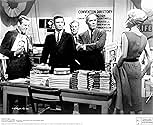CALIFICACIÓN DE IMDb
7.6/10
4 k
TU CALIFICACIÓN
Los dos aspirantes a la nominación presidencial de su partido, uno con principios y el otro despiadado, compiten por el respaldo del ex presidente.Los dos aspirantes a la nominación presidencial de su partido, uno con principios y el otro despiadado, compiten por el respaldo del ex presidente.Los dos aspirantes a la nominación presidencial de su partido, uno con principios y el otro despiadado, compiten por el respaldo del ex presidente.
- Nominado a 1 premio Óscar
- 1 premio ganado y 5 nominaciones en total
Penny Singleton
- Mrs. Claypoole
- (escenas eliminadas)
Anne Newman Bacal
- Janet
- (as Anne Newman)
Opiniones destacadas
The Best Man in a sense was dated before it ended its Broadway run of 520 performances in the 1960-1961 season. John F. Kennedy with his string of primary victories had the nomination almost decided before the Democrats met in Los Angeles that year to nominate him. After that, money raised and spent wisely in primaries decided nominations in both parties long before the conventions met. The last convention where there was a semblance of a contest was the 1976 Republican convention where it was not certain until the balloting that Gerald R. Ford would be the GOP candidate.
This film takes us back to the era of the smoke filled room although candidate Cliff Robertson pointedly tells former president Lee Tracy that he does not smoke. We've got two candidates at this fictional Democratic convention circa the sixties. One is Henry Fonda former Secretary of State, an intellectual in politics modeled on Adlai E. Stevenson and Cliff Robertson a no nonsense street fighter of a U.S. Senator that Joe McCarthy was the prototype.
By the way back in those days Joe McCarthy could easily have been a Democrat. Note that Robertson has the support of the lily white south in the era before the civil rights revolution. Minor candidate John Henry Faulk, a southern governor, is most concerned about mandated integration of his state's public schools. Back then the Dixie part of this country had a big influence in the Democratic party, the Republicans were almost moribund in many southern states. But they were a growing force.
Neither Fonda or Robertson really understands the motivations of the other. They're both courting the support of Lee Tracy a former Truman like president. In actual fact, Truman counted for very little once he was out of the White House. He anointed no successor in 1952 and in 1956 and 1960 his candidates were W. Averill Harriman and Stuart Symington respectively and both came up very short.
Fonda and Robertson both have dirt of varying degrees on the other. Fonda's dirt is supplied by former army buddy of Robertson's Shelley Berman who says that Robertson was gay. As it turns out Robertson ratted out a bunch of gay men in the service and got smeared in retaliation with the label. That sad to say has not changed even with don't ask don't tell in the Defense Department.
Fonda and Robertson's roles on Broadway were played by Melvyn Douglas and Frank Lovejoy. Lee Tracy who was the only carry over from Broadway, won a Tony Award and was nominated for an Oscar, but lost to Peter Ustinov for Topkapi. Tracy's is a finely etched portrayal of a bitter old man now out of real power and seeing his power to control events slipping by. Made even more bitter by the fact that he reads the characters of Fonda and Robertson very well, but can't influence either.
Gore Vidal aided in the transition of his play to the screen and it survived the journey from Broadway none the worse for wear. It's a fascinating look at a bygone era of politics when the national conventions meant something as opposed to being the media shows they are today.
In which we hope then as now that The Best Man will win out.
This film takes us back to the era of the smoke filled room although candidate Cliff Robertson pointedly tells former president Lee Tracy that he does not smoke. We've got two candidates at this fictional Democratic convention circa the sixties. One is Henry Fonda former Secretary of State, an intellectual in politics modeled on Adlai E. Stevenson and Cliff Robertson a no nonsense street fighter of a U.S. Senator that Joe McCarthy was the prototype.
By the way back in those days Joe McCarthy could easily have been a Democrat. Note that Robertson has the support of the lily white south in the era before the civil rights revolution. Minor candidate John Henry Faulk, a southern governor, is most concerned about mandated integration of his state's public schools. Back then the Dixie part of this country had a big influence in the Democratic party, the Republicans were almost moribund in many southern states. But they were a growing force.
Neither Fonda or Robertson really understands the motivations of the other. They're both courting the support of Lee Tracy a former Truman like president. In actual fact, Truman counted for very little once he was out of the White House. He anointed no successor in 1952 and in 1956 and 1960 his candidates were W. Averill Harriman and Stuart Symington respectively and both came up very short.
Fonda and Robertson both have dirt of varying degrees on the other. Fonda's dirt is supplied by former army buddy of Robertson's Shelley Berman who says that Robertson was gay. As it turns out Robertson ratted out a bunch of gay men in the service and got smeared in retaliation with the label. That sad to say has not changed even with don't ask don't tell in the Defense Department.
Fonda and Robertson's roles on Broadway were played by Melvyn Douglas and Frank Lovejoy. Lee Tracy who was the only carry over from Broadway, won a Tony Award and was nominated for an Oscar, but lost to Peter Ustinov for Topkapi. Tracy's is a finely etched portrayal of a bitter old man now out of real power and seeing his power to control events slipping by. Made even more bitter by the fact that he reads the characters of Fonda and Robertson very well, but can't influence either.
Gore Vidal aided in the transition of his play to the screen and it survived the journey from Broadway none the worse for wear. It's a fascinating look at a bygone era of politics when the national conventions meant something as opposed to being the media shows they are today.
In which we hope then as now that The Best Man will win out.
Henry Fonda and Cliff Robertson are neck and neck for the Presidential nomination in "The Best Man," a 1964 film based on the play by Gore Vidal, who also wrote the screenplay. The film sports an outstanding cast including Margaret Leighton, Kevin McCarthy, Edie Adams, Lee Tracy, Edie Adams, Ann Sothern, Shelley Berman, Gene Raymond and Howard K. Smith.
Fonda is William Russell, a wealthy man of principle, though he cheats on his wife; Robertson is Joe Cantwell, who chases Communists, is a "man of the people," and plays dirty. At one point, each candidate has something on the other that could lose them the nomination. Nowadays, of course, these items would have come out long, long before the convention. "One word from me and Joe Cantwell is out of politics," Russell muses to his wife (Leighton). But can he say the word? This is a fascinating look at the machinations of getting a President nominated, and asks the question, can a man retain his integrity and still be a politician? Vidal's answer comes as not much of a surprise.
Fonda played presidents and politicians throughout his career. As Russell, he has reserve and dignity. He keeps you guessing. Robertson does a great job as a disloyal sleaze. Lee Tracy, who started in silents, is fantastic as the current, ill President, repeating the role he played on Broadway. The rest of the cast is uniformly good.
So much of what is stated in "The Best Man" remains true today. I doubt these races are handled much differently now. The more things change, the more they remain the same. Especially in politics.
Fonda is William Russell, a wealthy man of principle, though he cheats on his wife; Robertson is Joe Cantwell, who chases Communists, is a "man of the people," and plays dirty. At one point, each candidate has something on the other that could lose them the nomination. Nowadays, of course, these items would have come out long, long before the convention. "One word from me and Joe Cantwell is out of politics," Russell muses to his wife (Leighton). But can he say the word? This is a fascinating look at the machinations of getting a President nominated, and asks the question, can a man retain his integrity and still be a politician? Vidal's answer comes as not much of a surprise.
Fonda played presidents and politicians throughout his career. As Russell, he has reserve and dignity. He keeps you guessing. Robertson does a great job as a disloyal sleaze. Lee Tracy, who started in silents, is fantastic as the current, ill President, repeating the role he played on Broadway. The rest of the cast is uniformly good.
So much of what is stated in "The Best Man" remains true today. I doubt these races are handled much differently now. The more things change, the more they remain the same. Especially in politics.
Two men vie for the presidential nomination of a party. Based on a play by Vidal, this is a fascinating behind-the-scenes look at the political machinations on the campaign trail. Although the name of the party is not identified in the film, the candidates display elements of both Democratic and Republican values. Fonda is the decent, old-school liberal while Robertson is his ruthless, right-leaning rival. Both turn in excellent performances. The standout in the fine supporting cast is Tracy as a former president who must decide which candidate to endorse. This is an ideal companion piece to "Advise and Consent," made a couple of years earlier and also starring Fonda.
The Best Man is from 1964 and it could have been made today. Gore Vidal first wrote it as a play which he later adapted for the screen. Vidal had real life experience as an insider in politics. He was on a first name basis with JFK. Henry Fonda stars as an idealistic politician running for president. Cliff Robertson is his opponent in a primary before the election. The man has no scruples and will do anything to win the election. The wheeling and dealing are shown in a very realistic manner. Vidal's script cuts like a razor sharp scalpel. More then fifty years later and nothing has changed. We need more Gore Vidal's today to cut through all the BS.
I work at a movie theatre and in a time of one-week wonders ( yes, one film with an action star lasted 3 days in our chain !) it is refreshing to see a film again where the acting is good and the story keeps your interest.
I am watching this movie after not seeing it for 30 years. It made an impression on me and I started listening to both Gore Vidal and William F Buckley because of it.
Henry Fonda's character is clearly based on Adlai Stevenson. Cliff Robertson echoes Richard Nixon so much it is scary. His arrogance is such that he gives the former President orders !
People decried the smoke-filled room politics of this era but I wonder if we got better leaders back then. They seemed to make decisions based on the courage of their convictions and not what the latest poll says. Fonda's character comments on his ignoring polls, whereas now, politicians can't seem to brush their teeth without worrying about public opinion and not what is best for the country.
The actors in this movie didn't need special effects and could ACT unlike so many of the baby-faced wanna-bes of today.
This movie reflects sex, immorality, infidelity, integrity. God and judgement day are even mentioned, something that is anathema today. And what's shown in here shows that times change but one could replace current politicians for these actors and see them immediately.
Lee Tracy is great in this movie and it could be easily watched for just his performance.
Of note, is the glad-handing by William Russell at a public pool. No security guards, no secret service people.
And mention of a nervous breakdown by Fonda's character. Remember Thomas Eagleton?
If you haven't seen this movie, see it and Seven Days In May afterward. It will give you an idea of how poliiics was looked upon in a totally different era.
George Senda Concord, Ca.
I am watching this movie after not seeing it for 30 years. It made an impression on me and I started listening to both Gore Vidal and William F Buckley because of it.
Henry Fonda's character is clearly based on Adlai Stevenson. Cliff Robertson echoes Richard Nixon so much it is scary. His arrogance is such that he gives the former President orders !
People decried the smoke-filled room politics of this era but I wonder if we got better leaders back then. They seemed to make decisions based on the courage of their convictions and not what the latest poll says. Fonda's character comments on his ignoring polls, whereas now, politicians can't seem to brush their teeth without worrying about public opinion and not what is best for the country.
The actors in this movie didn't need special effects and could ACT unlike so many of the baby-faced wanna-bes of today.
This movie reflects sex, immorality, infidelity, integrity. God and judgement day are even mentioned, something that is anathema today. And what's shown in here shows that times change but one could replace current politicians for these actors and see them immediately.
Lee Tracy is great in this movie and it could be easily watched for just his performance.
Of note, is the glad-handing by William Russell at a public pool. No security guards, no secret service people.
And mention of a nervous breakdown by Fonda's character. Remember Thomas Eagleton?
If you haven't seen this movie, see it and Seven Days In May afterward. It will give you an idea of how poliiics was looked upon in a totally different era.
George Senda Concord, Ca.
¿Sabías que…?
- TriviaLegend suggests that the future Republican American President Ronald Reagan, late in his previous career as a Hollywood actor, was rejected for a role in this film because a studio executive at United Artists didn't think he had "that presidential look". However, Gore Vidal, in one of his several essays attacking Reagan's presidency, says that Reagan was actually considered for the role of Joe Cantwell during preparations for the first Broadway production of his original play in 1960. (Frank Lovejoy eventually played Cantwell on stage). 1964, the year the film version appeared, was the year Reagan decisively left acting for politics, so Vidal's version of the story is the more likely.
- ErroresDuring the roll call, the chairman of the Pennsylvania delegation begins his announcement by saying "Mr Chairman, the State of Pennsylvania....". Pennsylvania is actually a Commonwealth, and any leading politician would refer to it as such.
- Citas
Joe Cantwell: I don't understand you.
William Russell: I know you don't. Because you have no sense of responsibility toward anybody or anything. And that is a tragedy in a man, and it is a disaster in a president.
- Créditos curiososDuring the opening credits, a picture of every single U.S. President appears in order, from George Washington to Lyndon Johnson.
- ConexionesFeatured in AFI Life Achievement Award: A Tribute to Henry Fonda (1978)
Selecciones populares
Inicia sesión para calificar y agrega a la lista de videos para obtener recomendaciones personalizadas
- How long is The Best Man?Con tecnología de Alexa
Detalles
- Fecha de lanzamiento
- País de origen
- Idioma
- También se conoce como
- The Best Man
- Locaciones de filmación
- Productora
- Ver más créditos de la compañía en IMDbPro
- Tiempo de ejecución1 hora 42 minutos
- Color
- Relación de aspecto
- 1.66 : 1
Contribuir a esta página
Sugiere una edición o agrega el contenido que falta

Principales brechas de datos
By what name was El mejor candidato (1964) officially released in India in English?
Responda

